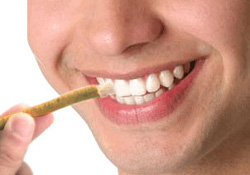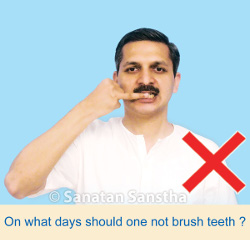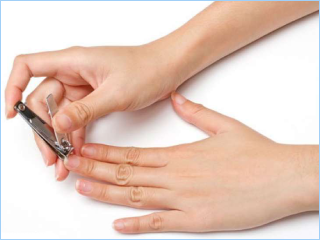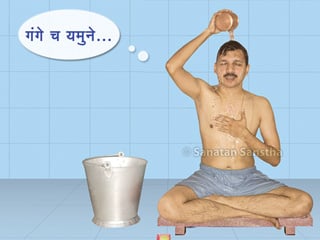1. After cleansing the teeth with a twig, discard it in the south-west direction

Underlying science : Discarding the used twigs charged with Raja-Tama predominant gases and waves in the south-west direction prevents pollution of the atmosphere
In the south-west direction, the process of dissolution is predominant. Since waves at the level of Dnyan-shakti (Energy of knowledge) and Kriya-shakti (Energy of action) are denser in this direction, the process of disintegration occurs rapidly with the help of kriya and at the level of Dnyan-dharana.
Thus twigs charged with Raja-Tama-predominant gases and waves when discarded in the south-west direction, the Raja-Tama-predominant particles there undergo disintegration keeping the atmosphere unpolluted.
– A Scholar (Through the medium of Mrs. Anjali Gadgil, 11th December 2007, 3.20 p.m.)
2. Rinse the mouth and then perform achaman
Steps in performing achaman
Performing achaman (Sipping water from the cupped palm thrice, while uttering the first three of the twenty-four names of Shrivishnu and releasing the water into a plate from the palm while uttering the fourth name) means uttering the twenty-four Names of Shrivishnu. When uttering the first three Names (Om Sri Keshavaya Namaha, Om Sri Narayaṇaya Namaha, Om Sri Madhavaya Namaha), sip water from the right palm after each Name. When uttering the fourth Name, release water from the right palm into a tamrapatra (copper vessel). When uttering the remaining twenty Names, do nyas (Chanting keeping the fingertips joined) by touching specific parts of the body.
Drinking bed-tea enhances the Tama component;
while having sattvik food or drink after rinsing the mouth
increases sattvikta, thus preventing the entry of black energy

Upon waking after a night’s sleep, due to the Tama environment and Tama nature of sleep, the physical and subtle bodies of an individual get charged with the Tama component. If anything is consumed without rinsing the mouth, it gets polluted with the Tama component and enhances the Tama component in the individual further. Often, negative energies release black energy into food and drink with Tama component, and gain access into an individual’s stomach. Thus, the individual can experience distress. Rinsing the mouth with water, followed by cleansing decreases the black energy in the mouth, teeth and gums and increases their sattvikta. Eating food after cleansing the mouth enhances sattvikta in the ingested food particles. Thus, sattvikta in the individual increases. Negative energies find it extremely difficult to release black energy into sattvik food or enter an individual’s body through sattvik food. That is why, Dharma advocates that we eat food only after rinsing the mouth. – God (Through the medium of Ms. Madhura Bhosale, 28th November 2007, 7.55 p.m.)
(Compare the inferior western culture which advocates the incorrect method of drinking bed-tea without rinsing the mouth, with the Hindu culture which advocates the spiritually correct method of eating only after rinsing the mouth ! – Compiler)
When should teeth not be brushed ? What is the underlying science ?
 1. Do not brush teeth on the days when a fast is observed
1. Do not brush teeth on the days when a fast is observed
Underlying science : On the day of a fast, the gastric heat is active which purifies the body; hence, to avoid any obstacles in this action, teeth should not be brushed. On rinsing the mouth while brushing teeth, the intensity of heat decreases
On the day of a fast, various waste gases are expelled into the voids of the body. On this day, the secretion ability of the cells increases. Due to the fast, the supply of external energy stops; hence, the internal gastric heat becomes active, and along with the strength of the Tej (Absolute Fire Principle)-predominant waves, disintegrates all the Raja-Tama-predominant gases and particles in the body. Fasting activates the dormant internal heat, which in turn activates the Pancha-prana (Five vital energies) that flows throughout the body and purifies all the sheaths of the subtle body. After brushing the teeth, the mouth has to be rinsed. Thus, the body comes into contact with water which emits Apatattva (Absolute Water Principle) waves. These can reduce the intensity of the heat that has increased in the body, and which helps disintegrate the Raja-Tama-predominant particles. Hence, it is advised that the teeth not be brushed on the days when a fast is observed. – A Scholar (Through the medium of Mrs. Anjali Gadgil, 20th July 2005, 12.21 p.m.)
2. Do not brush teeth on the day of Shraddha
(Special rituals performed for the departed ancestors)
Underlying science : The Tej-tattva which gets activated by the chanting of mantras during shraddha, can get depleted through water used to rinse the mouth while brushing
On the day of shraddha, the linga-dehas (Subtle-bodies) of ancestors descend onto the atmosphere of the earth and move about in their respective premises. This increases the proportion of Raja-Tama-predominant waves in the atmosphere. The sound waves from the mantras directly act on the individual performing shraddha, and activate its Panchaprana. Tej-predominant waves then start flowing into the individual, thus protecting it from the Raja-Tama-predominant atmosphere. To prevent reduction in the intensity of these Tej-predominant waves, the mouth is not rinsed even after meals on the day of shraddha. In this way, an attempt is made to retain the intensity of the internal body heat by minimum contact with water.
Water that is charged with mantras is used for cleansing the teeth, because the Tej-predominant waves are already enhanced in it through mantras. Therefore, in the earlier times, neem leaves, which are known for enhancing the Tej-tattva, would be put in water used for bathing. Similarly, a twig of neem was used for cleansing the teeth, and the juice obtained by chewing it would be swallowed for retaining the Tej-tattva in the body. Only then, one would commence rituals like shraddha or fasting.
On the day of Shraddha, the ancestors’ subtle-bodies come very close to the earth. In the earlier times, the ancestors too performed spiritual practice and were sattvik. Scriptures advised against cleansing of the teeth on the day of shraddha, so that the Tej in the blessings that the ancestors gave would not reduce. The Tejtattva in the blessings of ancestors would concentrate in the void of the mouth and easily enter the voids in the body with the help of either Vayu-tattva or Apa-tattva present in the sputum through this action.
– A Scholar (Through the medium of Mrs. Anjali Gadgil, 20th July 2007, 12.21 p.m. and 3rd October 2008, 9.04 p.m.)
Suggestions pertaining to the sequence of achars
Going to the toilet, washing hands and legs, rinsing the mouth and then brushing teeth – this is the sequence of achars. A sequence of brushing teeth, going to the toilet, washing hands and legs and then rinsing the mouth can be followed if someone is aged, or as per the temperament. Since the sole purpose in carrying out these actions is purification of the body, the sequence can be altered.

 Nine benefits of waking up at the Brahmamuhurt
Nine benefits of waking up at the Brahmamuhurt How to plan your day effectively?
How to plan your day effectively? Astrological viewpoint : On which days should nails be cut?
Astrological viewpoint : On which days should nails be cut? Varsha Rutucharya – a key to remaining healthy during the rainy season
Varsha Rutucharya – a key to remaining healthy during the rainy season Cleansing the teeth
Cleansing the teeth Prayer to be recited before a bathand shlokas to be recited while bathing
Prayer to be recited before a bathand shlokas to be recited while bathing